Startups developing a device for the isolation of extracellular vesicles, a transformative technology for brain surgery, green H2 production with microengineering, a novel water management software, and a new approach to help stroke patients each get CHF 10,000
27.06.2024
Acytronix, Clee Medical, Hydrode, Riverkin, and SaisiR were selected at Venture Kick's first financial and entrepreneurial support stage. Their projects develop a portable, easy-to-use device for the isolation of extracellular vesicles (EVs) from raw physiological fluids; provide a transformative technology for brain surgery by combining novel intraoperative imaging with AI & machine learning to make access to the brain faster, easier, and safer; offer innovative microstructured electrodes to boost alkaline electrolyzer efficiencies; empower stroke patients to regain their independence; and break down the barriers of traditional water management using novel hardware and intelligent software to create an interconnected ecosystem.
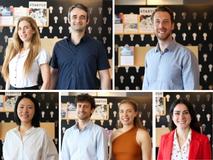 |
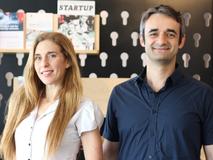 Acytronix: CEO Dr. Adva Krivitsky and CTO Dr. Vadim Krivitsky
|
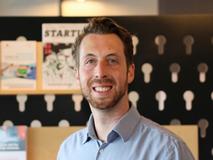 Clee Medical: Matthew Lapinski
|
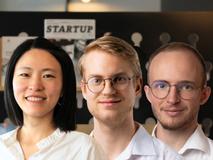 Hydrode: Dr. Lying Chen, Ray Klauck, and Moritz Schenker
|
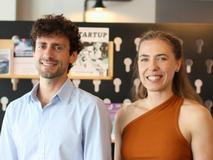 Riverkin: CTO Marco Adriano Magno and CEO Jessica Droujko
|
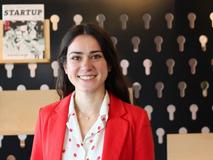 SaisiR: CEO Claudia Bigoni
|
Acytronix: revolutionizing the purification of extracellular vesicles with a mission to advance diagnostics and therapeutics
Extracellular vesicles (EVs) are nano-sized vesicles secreted by cells in our body. They are bioactive, represent the original tissue, and are distributed in bodily fluids. They are recognized as next-generation biomarkers and therapeutic agents. However, the need to initially isolate them from the complex native matrix limits their biomedical application.
Acytronix is an ETH spin-off based in Schlieren. The management team includes CTO Dr. Vadim Krivitsky and CEO Dr. Adva Krivitsky, with Prof. Jean-Christophe Leroux as the scientific advisor. They have developed a portable, easy-to-use device for isolating EVs from raw physiological fluids. This patent-protected device represents significant progress compared to conventional methods for EVs isolation, as it enables high-throughput isolation of EVs sub-populations according to surface marker expression, designed to advance EV-based liquid biopsy. Moreover, it uniquely offers the option to load the EVs with therapeutics on a single platform for drug delivery applications.
The Venture Kick funds will advance their platform towards market launch.
Clee Medical: transformative technology for brain surgery
Clee Medical is developing a transformative technology for brain surgery by combining novel intraoperative imaging with AI & machine learning to make access to the brain faster, easier, and safer
Matt Lapinski and Dr. Abed Hammoud founded Clee Medical. Matt brings his startup experience earned over a decade in Boston's medical device startup scene while Abed brings 25+ years of driving innovation in stereotactic neurosurgery, including leading companies purchased by the largest players in the world. The technology is being developed for a substantial market with a forecast service obtainable market of CHF 1.3 B.
The Venture Kick stage I funding will be used to strengthen the IP portfolio and plan a first-in-human clinical study.
Hydrode: boosting green H2 production with microengineering
Green H2 from water electrolysis using renewable electricity is the hope for achieving net zero by 2050. Alkaline electrolyzers have been dominating green H2 production with the cheapest price, but their efficiencies need further improvement to compete with non-green H2.
Hydrode was founded by a team from ETH Zürich: Dr. Liyang Chen specializing in surface nano/microengineering, Moritz Schenker from Micro and Nanosystems, and Ray Klauck from Computer Science. They developed innovative microstructured electrodes to boost alkaline electrolyzer efficiencies. Hydrode electrodes outperform conventional mesh electrodes with significantly reduced overall costs and higher efficiencies from microstructure-accelerated bubble removal, larger surface areas, and smaller electrical resistance. The SOM is estimated at USD 1.3 Bn in 2023 with a CAGR of 36% from 2024 to 2033.
The Venture Kick fund will contribute to patent filing, MVP development, and customer relationship management.
Riverkin: Combining large-scale water quality measurements and earth observation data with advanced hydrological models to support water resources management.
Climate change, population growth, and uncoordinated water planning have increased water-related issues such as shortages, natural disasters, poor water quality & biodiversity decline. Every industry relies on water; even the technology sector to cool data servers. Hydrologists know that improved water management can curtail these water-related issues. However, governments, agriculture, and other industries struggle to quantify water risks, respond to the effects of extreme events like landslides, implement mitigation strategies to enhance biodiversity, and reduce pollution due to the lack of high-quality, real-time data.
Riverkin’s team includes Dr. Jessica Droujko, an environmental engineer and CEO; Marco Adriano Magno, a robotics expert and CTO; and Dr. Nitin Kumar, an AI specialist and COO. They build, deploy, and manage a Water Data Ecosystem (WDE) comprised of their highly precise freshwater sensors and SaaS products. Riverkin targets a global smart water monitoring market valued at over $16 billion, addressing crucial needs in environmental protection, public health, and industrial efficiency.
Riverkin plans to utilize the VentureKick funds to accelerate its growth and enhance its market presence. The funds will be used to visit more clients, set up pilot projects, and refine their business and go-to-market strategy. This will enable them to build stronger relationships with stakeholders, demonstrate the value of their WDE through real-world applications, and optimize their approach to scaling their business.
SaisiR: Empowering stroke patients to regain their independence
25% of stroke survivors never regain independence and are unable to perform activities of daily living such as dressing, personal hygiene, and cooking, requiring assistance from caregivers. An effective treatment strategy is currently unavailable through standard therapies or existing neurotechnologies.
SaisiR introduces a new approach based on personalization and a combination of non-invasive neurotechnologies. The goal is to bridge the gap between the brain and the upper limb while addressing different patients’ needs. The intervention has been tested and validated in a Swissmedic-approved clinical trial conducted in two centers in Western Switzerland. Results were outstanding, with patients improving their upper limb functionality and being able to perform activities of daily living. SaisiR is based on the PhD project of Claudia Bigoni, which she carried out at EPFL; with this venture, she aims to make SaisiR’s approach accessible to millions of patients worldwide.
The Venture Kick Stage I fund will contribute to the initial development of the new product and initial marketing and branding to lay the groundwork for a successful product launch.
Extracellular vesicles (EVs) are nano-sized vesicles secreted by cells in our body. They are bioactive, represent the original tissue, and are distributed in bodily fluids. They are recognized as next-generation biomarkers and therapeutic agents. However, the need to initially isolate them from the complex native matrix limits their biomedical application.
Acytronix is an ETH spin-off based in Schlieren. The management team includes CTO Dr. Vadim Krivitsky and CEO Dr. Adva Krivitsky, with Prof. Jean-Christophe Leroux as the scientific advisor. They have developed a portable, easy-to-use device for isolating EVs from raw physiological fluids. This patent-protected device represents significant progress compared to conventional methods for EVs isolation, as it enables high-throughput isolation of EVs sub-populations according to surface marker expression, designed to advance EV-based liquid biopsy. Moreover, it uniquely offers the option to load the EVs with therapeutics on a single platform for drug delivery applications.
The Venture Kick funds will advance their platform towards market launch.
Clee Medical: transformative technology for brain surgery
Clee Medical is developing a transformative technology for brain surgery by combining novel intraoperative imaging with AI & machine learning to make access to the brain faster, easier, and safer
Matt Lapinski and Dr. Abed Hammoud founded Clee Medical. Matt brings his startup experience earned over a decade in Boston's medical device startup scene while Abed brings 25+ years of driving innovation in stereotactic neurosurgery, including leading companies purchased by the largest players in the world. The technology is being developed for a substantial market with a forecast service obtainable market of CHF 1.3 B.
The Venture Kick stage I funding will be used to strengthen the IP portfolio and plan a first-in-human clinical study.
Hydrode: boosting green H2 production with microengineering
Green H2 from water electrolysis using renewable electricity is the hope for achieving net zero by 2050. Alkaline electrolyzers have been dominating green H2 production with the cheapest price, but their efficiencies need further improvement to compete with non-green H2.
Hydrode was founded by a team from ETH Zürich: Dr. Liyang Chen specializing in surface nano/microengineering, Moritz Schenker from Micro and Nanosystems, and Ray Klauck from Computer Science. They developed innovative microstructured electrodes to boost alkaline electrolyzer efficiencies. Hydrode electrodes outperform conventional mesh electrodes with significantly reduced overall costs and higher efficiencies from microstructure-accelerated bubble removal, larger surface areas, and smaller electrical resistance. The SOM is estimated at USD 1.3 Bn in 2023 with a CAGR of 36% from 2024 to 2033.
The Venture Kick fund will contribute to patent filing, MVP development, and customer relationship management.
Riverkin: Combining large-scale water quality measurements and earth observation data with advanced hydrological models to support water resources management.
Climate change, population growth, and uncoordinated water planning have increased water-related issues such as shortages, natural disasters, poor water quality & biodiversity decline. Every industry relies on water; even the technology sector to cool data servers. Hydrologists know that improved water management can curtail these water-related issues. However, governments, agriculture, and other industries struggle to quantify water risks, respond to the effects of extreme events like landslides, implement mitigation strategies to enhance biodiversity, and reduce pollution due to the lack of high-quality, real-time data.
Riverkin’s team includes Dr. Jessica Droujko, an environmental engineer and CEO; Marco Adriano Magno, a robotics expert and CTO; and Dr. Nitin Kumar, an AI specialist and COO. They build, deploy, and manage a Water Data Ecosystem (WDE) comprised of their highly precise freshwater sensors and SaaS products. Riverkin targets a global smart water monitoring market valued at over $16 billion, addressing crucial needs in environmental protection, public health, and industrial efficiency.
Riverkin plans to utilize the VentureKick funds to accelerate its growth and enhance its market presence. The funds will be used to visit more clients, set up pilot projects, and refine their business and go-to-market strategy. This will enable them to build stronger relationships with stakeholders, demonstrate the value of their WDE through real-world applications, and optimize their approach to scaling their business.
SaisiR: Empowering stroke patients to regain their independence
25% of stroke survivors never regain independence and are unable to perform activities of daily living such as dressing, personal hygiene, and cooking, requiring assistance from caregivers. An effective treatment strategy is currently unavailable through standard therapies or existing neurotechnologies.
SaisiR introduces a new approach based on personalization and a combination of non-invasive neurotechnologies. The goal is to bridge the gap between the brain and the upper limb while addressing different patients’ needs. The intervention has been tested and validated in a Swissmedic-approved clinical trial conducted in two centers in Western Switzerland. Results were outstanding, with patients improving their upper limb functionality and being able to perform activities of daily living. SaisiR is based on the PhD project of Claudia Bigoni, which she carried out at EPFL; with this venture, she aims to make SaisiR’s approach accessible to millions of patients worldwide.
The Venture Kick Stage I fund will contribute to the initial development of the new product and initial marketing and branding to lay the groundwork for a successful product launch.


